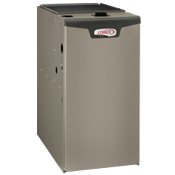Gas vs Electric Furnace: Which is Better for My NJ Home?
November 11, 2024

Electric vs. gas, which is better?
While both systems have pros and cons, we suggest a gas furnace for homeowners living in New Jersey. Gas furnaces provide faster heating and cost less to operate monthly, making them a better option for homeowners living in cold climates.
However, gas isn’t the best option for all New Jersey homeowners.
To help you determine what the best option is for your New Jersey home, we’ll break down:
- How electric & gas furnaces work
- Key differences between electric and gas
- An alternative option: Dual Fuel
How electric & gas furnaces work
Gas- Gas furnaces create warm air through a process called combustion. Essentially, your gas furnace has a set of metal coils (called a heat exchanger) that are inside a combustion chamber.
When your thermostat tells your furnace that your home needs warming up, cold air is blown over hot metal tubes called the heat exchanger. These tubes are heated by hot combustion gases that travel through the inside of these tubes.
That warm air is then pumped into your home through ducts.
Electric- Electric furnaces work similarly to gas furnaces in that cold air is sucked into the furnace, heated and blown out as warm air.
The biggest difference in how these two furnaces work is that while gas furnaces heat with gas burners, electric furnaces have electric heating elements, warming air without producing any gases.
Key Differences between gas & electric furnaces
Installation Cost
Electric furnaces are less expensive to install than gas furnaces (and last longer).
Because gas furnaces actually produce gases, the installation cost is more complicated (and therefore expensive) due to venting requirements. Once installed, gas furnaces usually last about 10 to 15 years.
Electric furnaces don’t produce gas, so they don’t need to vent to the exterior, making this installation process simpler and less expensive. They can last longer than gas furnaces, up to 20 years.
Monthly Cost
Gas furnaces are cheaper to operate monthly than electric furnaces because natural gas is cheaper to produce than electricity is.
However, you must have access to natural gas to use a gas furnace. If you already have access to natural gas on your property, a gas furnace is a great option. If you don’t, you will have to factor in the cost of running a gas line to your home (a plumber will generally charge between $1,500 and $3,000 to run a gas line).
Heating Ability
Gas furnaces can heat your home faster than electric ones. How? We’ll explain.
Gas furnaces produce the maximum heat as soon as the burners turn on, whereas electric furnaces take time to power the heating element before heating can begin.
This results in faster and more powerful home heating.
Maintenance & Safety:
Gas- As mentioned above, gas furnaces produce gases during the combustion process, and some of those gases are dangerous. If your furnace is running smoothly, these dangerous gases won’t be an issue, but if something breaks, poisonous gases like carbon monoxide could leak into your home’s air.
Because of this, homeowners absolutely need to maintain their gas furnace annually to ensure it’s working safely.
Electric- Unlike gas furnaces, electric furnaces don’t produce gases, which means you don’t have to worry about carbon monoxide leaks.
Homeowners should still have electric furnaces checked annually, but don’t have to worry about dangerous gases leaking into their home.
As long as you keep your furnace properly maintained, you shouldn’t experience any dangerous situations with your gas furnace. However, when comparing the two, electric is the safer option.
Have access to natural gas? Consider a dual fuel system
A great alternative for New Jersey residents who have access to natural gas is a dual fuel system. Essentially, a dual fuel system is a combination of an electric heat pump and a gas furnace, bringing you the best of both worlds.
When the temperature is mild (above 30 degrees), your electric heat pumps works to heat your home.
When temperatures get colder (below 30 degrees) and your electric heat pump begins to fall behind, the more powerful gas furnace kicks on to heat your home.
Still have questions? A New Jersey tech can help!
New Jersey homeowners rely on us because we are fast, fair, respectful and we do the job well. Ask an expert which type of furnace is best for your home or schedule your installation!
